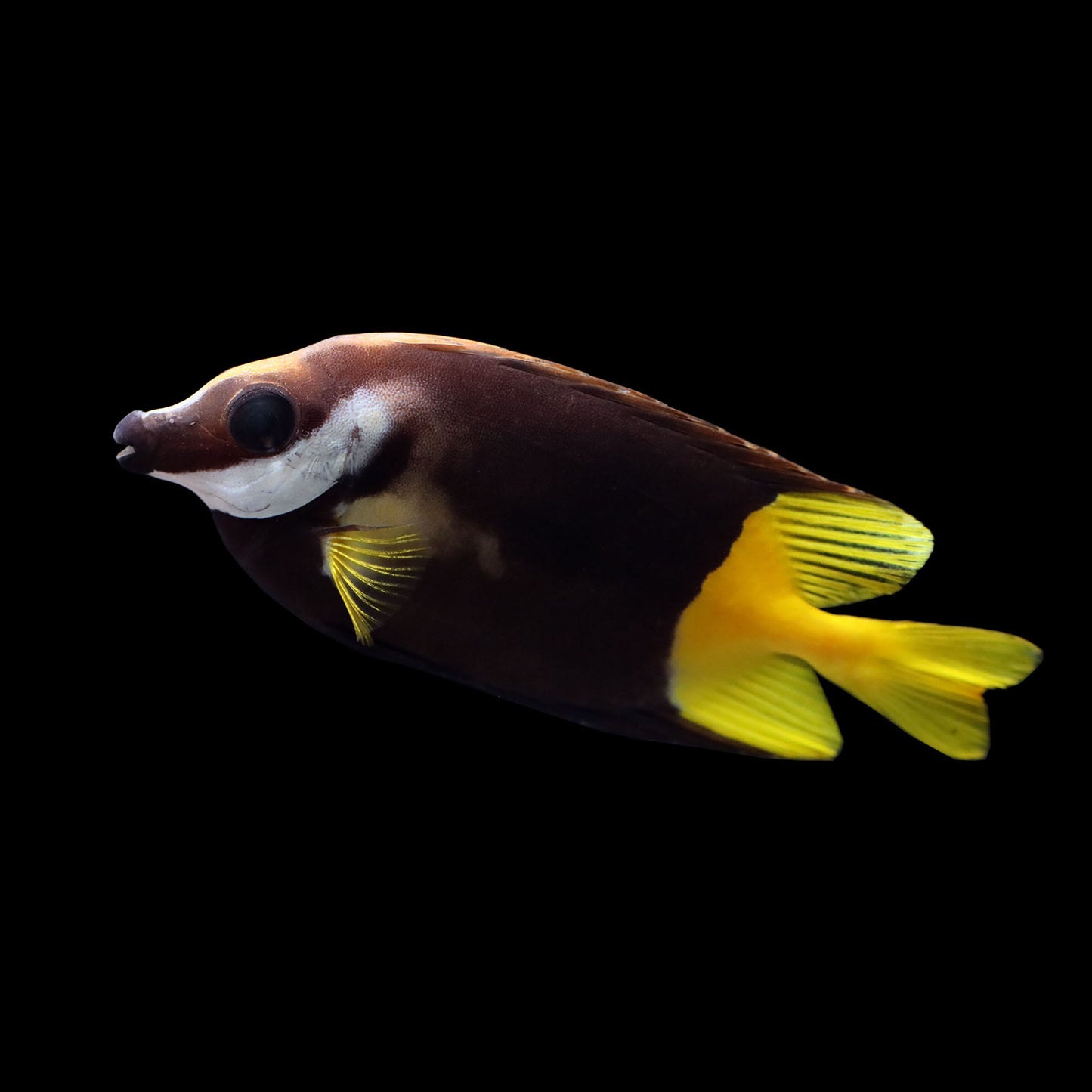AQUARIUM ARTS
Fiji Foxface Rabbitfish (Siganus uspi)
Fiji Foxface Rabbitfish (Siganus uspi)
Couldn't load pickup availability
Fiji Foxface Rabbitfish (Siganus uspi)
Discover the Unique Fiji Foxface Rabbitfish
The Fiji Foxface Rabbitfish is a stunning and hardy species known for its striking coloration and algae-grazing abilities. This peaceful and easy-to-care-for fish is an excellent addition to both reef and fish-only aquariums, where its unique appearance and functional role as an algae-eater make it a valuable asset. With its bold pattern and active behavior, the Fiji Foxface Rabbitfish is a popular choice among both novice and experienced aquarists.
Appearance: The Fiji Foxface Rabbitfish features a distinctive appearance, with its bright yellow body and dark brown to black face, creating a striking contrast. Its body also showcases white and light gray markings that add to its visual appeal. One of the standout features of this fish is its long dorsal fin, which can extend impressively when the fish feels threatened or excited. Their coloration and sleek body shape give them an elegant, yet bold, presence in any aquarium.
Behavior: Fiji Foxface Rabbitfish are peaceful and typically get along well with a variety of tankmates. They are known for their calm demeanor, but can be shy and skittish when first introduced to the aquarium. Over time, they become more confident and active, spending much of their time grazing on algae or swimming peacefully around the tank. While generally peaceful, they do possess venomous dorsal spines, so handling with care is essential. These spines are used defensively, but they rarely cause problems in a typical tank setting.
Diet: Fiji Foxface Rabbitfish are herbivores and are highly valued for their algae-grazing abilities. They will naturally feed on algae growing on live rock and aquarium surfaces, helping to control unwanted algae growth in the tank. Their diet should be supplemented with marine-based algae sheets, spirulina, and high-quality herbivore pellets or flakes. Occasionally, they may also accept frozen foods such as mysis shrimp or brine shrimp, though their primary diet should remain plant-based to maintain their health and vibrant coloration.
Tank Requirements: The Fiji Foxface Rabbitfish requires a minimum tank size of 125 gallons due to its active nature and potential adult size. These fish need plenty of swimming space, along with live rock to graze on and hiding spots to retreat to when they feel threatened. Stable water quality and a well-maintained environment are essential for keeping them healthy and stress-free.
Tankmates: Fiji Foxface Rabbitfish are peaceful and can be housed with a variety of other non-aggressive species. Suitable tankmates include tangs, clownfish, angelfish, and wrasses. Avoid housing them with overly aggressive or territorial species, as the Fiji Foxface may become stressed in a hostile environment. Their peaceful nature makes them ideal for community setups, and their ability to help control algae growth makes them a functional addition to any tank.
Reef Aquarium Compatibility: Fiji Foxface Rabbitfish are generally reef-safe and will not harm corals. Their algae-eating habits can be beneficial in reef tanks, as they help control algae without disturbing corals or invertebrates. However, it’s important to keep them well-fed, as underfed rabbitfish may occasionally nip at soft corals or algae-like invertebrates. Overall, they are a great choice for both reef and fish-only aquariums.
Max Size: The Fiji Foxface Rabbitfish can grow up to 9 inches (23 cm) in length, making them a medium to large-sized fish that requires ample space to thrive.
Origin: As the name suggests, the Fiji Foxface Rabbitfish is native to the waters around Fiji and the South Pacific. They are typically found in coral-rich areas where they graze on algae.
Interesting Facts:
- Fiji Foxface Rabbitfish have venomous dorsal spines used for defense, so caution should be taken when handling or working in the tank.
- Their algae-eating abilities make them a valuable addition to marine aquariums, helping to control unwanted algae growth.
- Their striking yellow and black coloration, along with their peaceful nature, makes them a favorite among marine hobbyists.
Disclaimer: Aquarium Arts cannot guarantee compatibility with your current fish or the fish you buy and cannot be held liable for fish lost due to aggression.
Share


